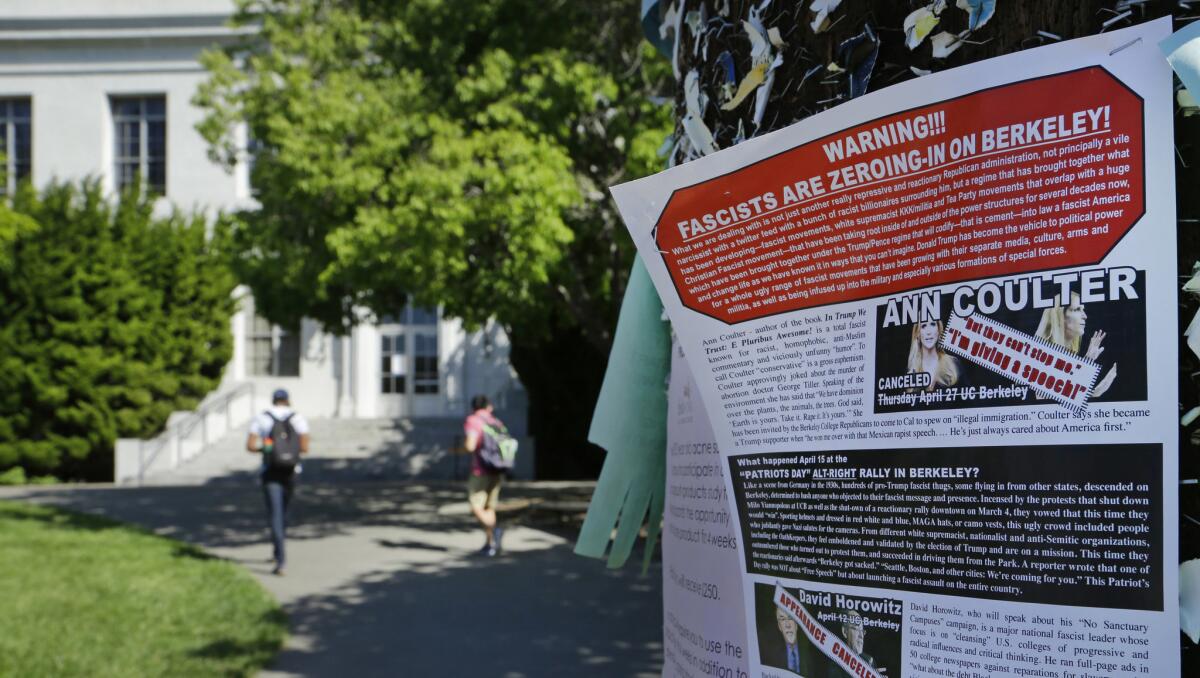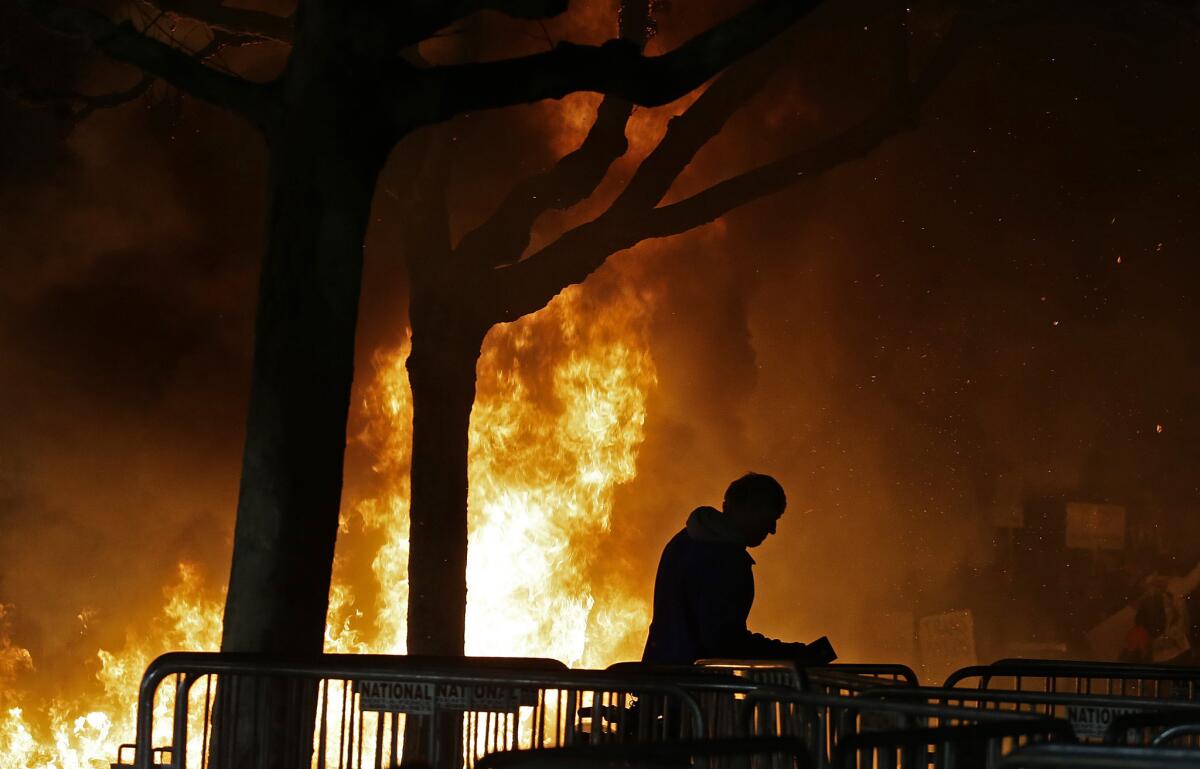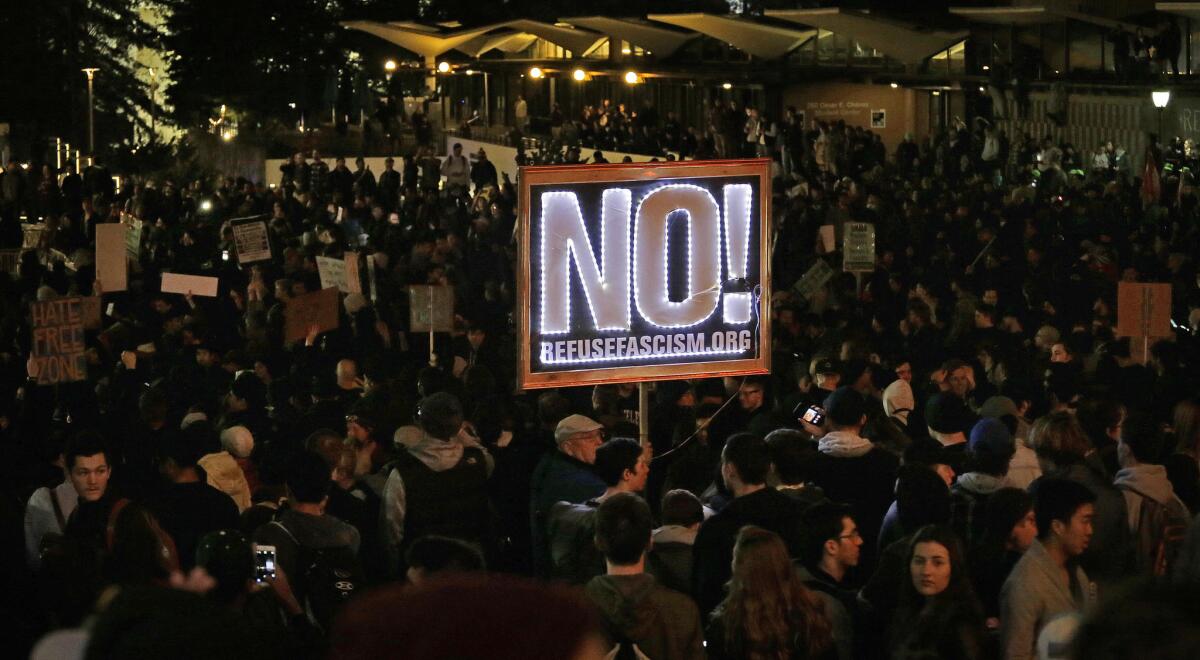Ann Coulter, free speech and UC Berkeley: How a talk became a political bombshell

- Share via
Will Ann Coulter speak at UC Berkeley this week?
It’s a question that has consumed the university for weeks and on Monday actually sparked a federal lawsuit from College Republicans who invited the conservative author to speak.
Coulter’s proposed talk has become a flashpoint for several reasons.

1. Concerns over more violent protests.
Coulter is an outspoken conservative and supporter of President Trump. But it’s not her message than has sparked concern from Berkeley officials but the prospect that it might spark more violent protests.
A February scheduled appearance at UC Berkeley by conservative provocateur Milo Yiannopoulos was canceled amid a violent protest on the campus. That sparked a national debate — in which President Trump took part — about the balance between the right to demonstrate and protecting free speech that some find objectionable.
There have been two other clashes in the city of Berkeley since then, including one Saturday in which 21 people were arrested.
Some in Berkeley charge that the most extreme protesters on both sides are outsiders inciting violence for their own ends.
The UC Berkeley campus is known as the home of the free speech movement. That’s one reason conservative activists have used it as a setting for several recent rallies.
Berkeley officials canceled Coulter’s speech last week, citing concerns over more protests. A day later they reversed themselves.
2. Battle over free speech
Berkeley’s decision to cancel the speech prompted a backlash from those who say the university should not suppress unpopular speech even if it brings protesters to campus.
University officials have generally supported talks from Coulter and others and condemned those who try to shut them down.
“We have an unwavering commitment to providing for the safety and well-being of speakers who come to campus, our students and other members of our campus and surrounding communities,” Chancellor Nicholas Dirks said in a statement last week. “While there may, at times, be tension between these paired commitments, we cannot compromise either.”
In January, Yiannopoulos and former pharmaceutical executive Martin Shkreli were supposed to speak at UC Davis. But protests prompted officials to cancel the event.
Earlier this month, demonstrators disrupted a planned public event at Claremont McKenna College featuring conservative commentator and author Heather Mac Donald.
Some academics say the stakes are high, particularly as the nation is facing deepening political divisions in the era of Trump.

3. Questions of timing and symbolism
Berkeley administrators had rescheduled Coulter’s appearance for May 2, when they said the university could provide adequate security. Coulter has vowed to speak April 27, as originally scheduled. And that has sparked the federal lawsuit.
In its suit, the Berkeley College Republicans — which planned to host Coulter — called that date a “sham” intended to ensure her address was poorly attended.
According to Harmeet Dhillon, a lawyer representing the students, Berkeley has adopted an unwritten policy under which it declares certain speakers “high-profile” and then restricts when and where they can appear on campus.
The day offered to Coulter falls during “dead week,” when students are studying for final exams and the campus traditionally is deserted. The university also had said Coulter would have to speak at midday, in a science hall located away from the central campus, rather than during the evening.
The lawsuit, filed in U.S. District Court in San Francisco, seeks an injunction against Berkeley’s enforcement of its policy regarding speakers.
A university spokesman on Monday said no such policy exists.
“Nobody here understands what they are referring to,” Dan Mogulof said, adding that there was no “cookie-cutter” approach to dealing with campus event requests. In the case of Coulter, the spokesman said, university officials felt those who might show up to protest her posed a risk.
Coulter has said she intends to speak Thursday whether or not her appearance is sanctioned. Dhillon said the groups that originally invited her have not determined if they will be party to that. “They’ll have to make that decision on that day,” the lawyer said.
The primary financial sponsor for Coulter’s Berkeley appearance — Young America’s Foundation, a national conservative nonprofit — is a party to the lawsuit. Coulter’s fee is listed on the organization’s website as in excess of $20,000.
ALSO
Republican students sue to allow Ann Coulter’s speech this week at UC Berkeley
UC Berkeley reverses decision to cancel Ann Coulter visit
The Bill O’Reilly case shows how much Fox News and UC Berkeley have (horrors!) in common
More to Read
Sign up for Essential California
The most important California stories and recommendations in your inbox every morning.
You may occasionally receive promotional content from the Los Angeles Times.











